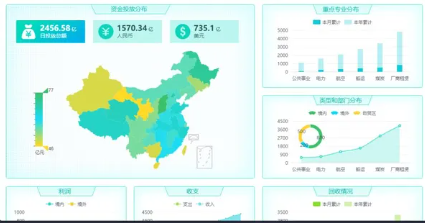A Middle Eastern consortium has partnered with Li Ka-shing Gates to invest in a hydrogen-electric aircraft. The world’s wealthiest man has invested in this innovative aircraft, which is designed to emit zero emissions.
ZeroAvia, a US-based hydrogen-powered aircraft company, recently secured the largest financing in history, with a funding round led by Airbus, Barclays Sustainable Impact Capital, and NEOM. Existing shareholders, including
Breakthrough Energy Ventures, Li Ka-shing’s Horizons Ventures, Amazon Climate Pledge Fund, Alaska Airlines, Ecosystem Integrity Fund, Summa Equity, and AP Ventures, also participated in the funding round. ZeroAvia is
committed to transforming the aviation industry into a clean industry by using hydrogen electric propulsion systems as the most environmentally friendly and economically attractive solution. The company’s business covers
hydrogen production and aircraft manufacturing, with a focus on hydrogen as a potential alternative to jet fuel. The company’s hydrogen-electric engines use hydrogen from fuel cells to generate electricity, which is used
in the propellers that power the electric motors. ZeroAvia’s popularity can be attributed to its ability to bring together billionaires, investment institutions, and aviation groups from around the world.
Similar to the automotive industry, the aircraft sector is also seeing a shift towards environmentally-friendly practices, with many companies and start-ups entering this field. ZeroAvia, for instance, focuses on
hydrogen as an alternative to jet fuel, covering both hydrogen production and aircraft manufacturing. Their hydrogen-electric engines generate electricity using hydrogen from fuel cells, with water being the only waste
product. The entire process is emission-free, powered by solar energy and hydrogen combustion. However, high production costs remain a challenge. In early 2023, ZeroAvia completed the first flight of the largest hydrogen-electric
aircraft in history, with commercialization set to begin gradually in 2024. The company has raised over $150 million in funding from notable investors such as Bill Gates, Li Ka-shing, British Airways, Shell, and the British
government. Ultimately, ZeroAvia aims to develop hydrogen power systems for larger aircraft and become a leader in the future of aviation.
ZeroAvia has a consistent financing pattern, taking an average of 3-6 months to complete a new round of funding, with an amount of approximately $30 million. Well-established investors such as Bill Gates, Li Ka-shing,
Shell, and Amazon continue to participate in almost every round of funding, while more aviation groups are also investing in ZeroAvia and providing orders. Notably, Bill Gates’ Breakthrough Energy Ventures (BEV) is one of
the investors behind ZeroAvia and is considered the “most luxurious investment team in history.” BEV is a venture capital institution founded by Bill Gates in 2015 and has enlisted 28 of the world’s top richest people or
families as co-investors with a fund size of $1 billion and an investment period of 20 years. The purpose of BEV is to invest in scientific breakthroughs that have the potential to bring cheap and reliable clean energy to
the world, with the goal of ultimately bringing new zero-carbon technologies to market. The fields involved include carbon dioxide capture, energy Internet of Things, biosynthesis, energy storage companies, sustainable
fuels, power batteries, and many others. Even local tycoons in the Middle East, who made their fortunes on oil, are transitioning to clean energy. NEOM, a Middle East consortium and investor in ZeroAvia, is an excellent
example. Shell has also been committed to the transition to clean energy in recent years and no longer emphasizes itself as a lubricant company but as an energy company. Victoria Harbor Investment, an investment institution
entirely independent of Li Ka-shing’s other industries, has always provided Li Ka-shing with sufficient cash flow, and its every move represents Li Ka-shing’s important strategy.
The adoption of clean energy has become a widespread trend among energy corporations and affluent individuals. Hydrogen is considered a new, clean energy source and is viewed as the ultimate solution for zero-emission
flights. Aviation is a significant contributor to carbon emissions, responsible for over 2% of global emissions and is the fastest-growing source of greenhouse gas emissions. Despite electricity being a low-carbon option,
hydrogen-electric aircraft are gaining popularity among industry leaders. This is because hydrogen is more environmentally friendly and suitable for heavy-loading, long-distance flights. Over 70% of current power
generation comes from thermal power, which generates a considerable amount of pollution. However, more than 85% of hydrogen energy is green hydrogen produced by renewable energy and nuclear power. Hydrogen energy has a
cruising range of thousands of kilometers, making it suitable for long-distance travel, while pure electric aircraft have a cruising range of around 100 kilometers. Additionally, the battery used in pure electric aircraft
weighs approximately 40 times more than aviation fuel. Hydrogen energy can be rapidly refueled like gasoline, unlike pure electric aircraft that require a long charging time. Therefore, hydrogen energy can fill the gap in
electrification technology and play an important role in the transformation of heavy industry. The National Development and Reform Commission’s “Medium and Long-term Plan for Hydrogen Energy Development (2021-2035)”
predicts that 60% of China’s energy consumption will be electrified by 2060. However, for the remaining 40% of industries that are difficult to electrify, low-carbon fuels like hydrogen should be promoted. Heavy road
transport, shipping, aviation, steel, and chemical industries require portable, energy-dense fuels.
China aims to electrify about 60% of its energy consumption by 2060, according to the “Medium and Long-term Plan for Hydrogen Energy Development (2021-2035)” released by the National Development and Reform Commission.
The remaining 40% of industries, which are more challenging to electrify, will need to rely on low-carbon fuels. These include heavy road transport, shipping, aviation, steel, and chemical industries that require
energy-dense fuels. Hydrogen energy is a promising alternative for these industries as it is completely clean. The report predicts that hydrogen consumption will increase from its current low level to over 17 exajoules
per year in 2060, equivalent to 580 million tons of coal or 16% of total final energy consumption. However, the development of hydrogen energy faces challenges such as the competition with power batteries and the need for
a separate refueling network, which is costly. Additionally, there are still issues with the storage and transportation of hydrogen fuel. Therefore, the development of hydrogen energy will require patience and long-term
investment.






